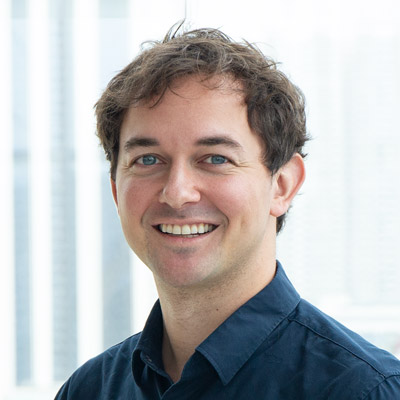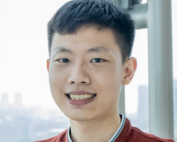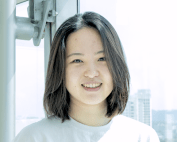
Andrew Holle
Assistant Professor, Mechanobiology Institute, National University of Singapore
bieawh@nus.edu.sg
andrew.w.holle@gmail.com
10-03D
Level 10 T-Lab
National University of Singapore
5A Engineering Drive 1
Singapore 117411
Laboratory website
Confinement Mechanobiology Lab
Affiliations
Department of Biomedical Engineering, National University of Singapore
Andrew Holle
Principal Investigator
Research Areas
Cell Migration, Stem Cell Mechanobiology, Cancer Mechanobiology
Research Interests
The broad objective of the Confinement Mechanobiology Lab is to use mechanobiology principles and recent observations on the nature of small, fluid-filled ‘cellular highways’ in the interstitial extracellular matrix (ECM) to identify, engineer, and leverage the role of confinement in stem cell differentiation. The presence of stem cells in nearly every tissue suggests that wound healing and regeneration depend on localized differentiation, but recent work has shown that bone marrow stem cells are enriched in distant healing sites, proving they must exit the marrow or other local niches and squeeze through heterogeneous layers of ECM with varied mechanical properties. Despite this, little is known of the mechanical environment that stem cells are exposed to on their migratory journey, even as it has become widely accepted that stem cells actively differentiate in response to mechanical signaling.
Using interdisciplinary approaches, the Confinement Mechanobiology lab aims to test the hypothesis that for stem cell mechanotransduction and differentiation, “it’s the journey, not the destination.” We then leverage that knowledge to establish cutting-edge biophysical approaches to tissue organization. These approaches include characterizing the currently unexplored interstitial fluid-filled channels present in nearly every tissue in the body, engineering microfluidic systems that mimic the ECM confinement present in these interstitial spaces, then measuring stem cell differentiation as a function of confined migration through microchannels of controlled dimensions, and developing tissue engineering platforms for spatial and temporal control of stem cell differentiation and subsequent hierarchical cell population assembly.
The Confinement Mechanobiology lab pursues research that is an interdisciplinary fusion of mechanobiology, tissue engineering, microfluidics, and nanotechnology, with an end goal of discovering and utilizing the unknown molecular mechanisms underlying mechanosensitive migratory stem cell differentiation. This step forward from the current paradigm of stem cell differentiation as a mostly biochemical process has an untapped potential to unlock future basic and applied research applications in biophysics, stem cell biology, and tissue engineering.
Education
B.S.E. in Bioengineering (Minor in Statistics), Arizona State University (2008)
Ph.D. in Bioengineering, University of California San Diego (2013)
Biography
Andrew Holle received a Bachelor of Science, Engineering (B.S.E) from Arizona State University, where he worked in labs of Dr. Christine Pauken and Dr. Deirdre Meldrum. He then received his Ph.D. at the University of California, San Diego, where he worked in Dr. Adam Engler’s Stem Cell Biology and Bioengineering group. There, he identified the mechanosensitive role of the focal adhesion protein vinculin in substrate stiffness-induced stem cell differentiation. Looking to explore the commonalities between stem cell and cancer mechanobiology, he then joined Prof. Joachim Spatz’s Cellular Biophysics group at the Max Planck Institute for Medical Research (Stuttgart, Germany). There, he used photolithography and microfluidics to build microchannel assays to better characterize cancer cell invasion and migration in confinement. His work at the Mechanobiology Institute and in the NUS Biomedical Engineering department will focus on the role of confinement in mechanobiology, with an emphasis on novel strategies for controlling stem cell differentiation.
Recent Publications
- Ong HT, Sriram M, Susapto HH, Li Y, Jiang Y, Voelcker NH, Young JL, Holle AW, and Elnathan R. The Rise of Mechanobiology for Advanced Cell Engineering and Manufacturing. Adv Mater 2025;:e2501640. [PMID: 40576525]
- Kumari A, Kumar A, Xu G, Roy K, Pratap R, Holle A, and Tijore A. Confinement Suppresses Mechanical Force-Mediated Cancer Cell Apoptosis. Small 2025;:e2504261. [PMID: 40556557]
- Chang Y, Lee JWN, and Holle AW. The mechanobiology of fibroblast activation in disease. APL Bioeng 2025; 9(2):021505. [PMID: 40538750]
- Gao X, Li Y, Lee JWN, Zhou J, Rangaraj V, Marlena J, and Holle AW. Confined Migration Drives Stem Cell Differentiation. Adv Sci (Weinh) 2025;:e2415407. [PMID: 40344472]
- Li Y, Ong HT, Cui H, Gao X, Lee JWN, Guo Y, Li R, Pennacchio FA, Maiuri P, Efremov AK, and Holle AW. Confinement-sensitive volume regulation dynamics via high-speed nuclear morphological measurements. Proc Natl Acad Sci U S A 2024; 121(52):e2408595121. [PMID: 39700138]
- Chitnis M, Gao X, Marlena J, and Holle A. The mechanical journey of primordial germ cells. Am J Physiol Cell Physiol 2024;. [PMID: 39466178]
- Lee JWN, and Holle AW. Engineering approaches for understanding mechanical memory in cancer metastasis. APL Bioeng 2024; 8(2):021503. [PMID: 38605886]
- Todorovski V, McCluggage F, Li Y, Meid A, Spatz JP, Holle AW, Fox AH, and Choi YS. Confined environments induce polarized paraspeckle condensates. Commun Biol 2023; 6(1):145. [PMID: 36737664]
- Khachaturyan G, Holle AW, Ende K, Frey C, Schwederski HA, Eiseler T, Paschke S, Micoulet A, Spatz JP, and Kemkemer R. Temperature-sensitive migration dynamics in neutrophil-differentiated HL-60 cells. Sci Rep 2022; 12(1):7053. [PMID: 35488042]
- Elnathan R, Holle AW, Young J, George MA, Heifler O, Goychuk A, Frey E, Kemkemer R, Spatz JP, Kosloff A, Patolsky F, and Voelcker NH. Optically transparent vertical silicon nanowire arrays for live-cell imaging. J Nanobiotechnology 2021; 19(1):51. [PMID: 33596905]
Selected Publications (last 10)
- Wei, Q., Holle, A.W., Li, J., Posa, F., Biagioni, F., Crocii, O., Benk, A., Young, J., Noureddine, F., Deng, J., Zhang, M., Inman, G.J., Spatz, J.P., Campaner, S., Cavalcanti-Adam, E.A. “BMP-2 signaling and mechanotransduction synergize to drive osteogenic differentiation via YAP/TAZ” Advanced Science 1902931 (2020)
- Wei, Q., Young, J.L., Holle, A.W., Li, J., Bieback, K., Inman, G., Spatz, J.P., Cavalcanti-Adam, E.A. “Soft Hydrogels for Balancing Cell Proliferation and Differentiation” ACS Biomaterials Science & Engineering 6, 4687-4701 (2020)
- Yu, L., Hou, Y., Xie, W., Camacho, L.C., Cheng, C., Holle, A.W., Young, J., Trappmann, B., Zhao, W., Melzig, M.F., Cavalcanti-Adam, E.A., Zhao, C., Spatz, J.P., Wei, Q., Haag, R. “Integrin α5β1and Rac signaling promote cell adhesion in a contractility-independent manner on dynamic ligand surfaces” 32, 2002566 Advanced Materials (2020)
- Kadiri, V.M., Bussi, C., Holle, A.W., Son, K., Kwon, H., Schütz, G., Gutierrez, M., Fischer, P. Transfection of cells via active transport of magnetic FePt nanopropellers Advanced Materials 2001114 (2020)
- Kim, C., Young, J.L., Holle, A.W., Jeong, K., Major, L., Jeong, J.H., Aman, Z., Han, D.W., Hwang, Y., Spatz, J.P., Choi, Y.S. “Stem cell mechanosensation on gelatin methacryloyl (GelMA) stiffness gradient hydrogels” Annals of Biomedical Engineering 48, 893-902 (2020)
- Ma, Z., Holle, A.W., Melde, K., Qiu, T., Peoppel, K., Kadiri, V.M., Fischer, P. “Acoustic Holographic Cell Patterning in a Biocompatible Hydrogel” Advanced Materials 32, 1904181 (2020)
- Major, L.G.*, Holle, A.W.*, Young, J.L.*, Chin, I., Hepburn, M., Sanderson, R., Kennedy, B., Spatz, J.P., Han, D.W., Hwang, Y., Park, H.W., Guan, K.L., Choi, Y.S. “Volume adaptation controls stem cell mechanotransduction” ACS Applied Materials and Interfaces 11, 45520-45530 (2019) *Equal contribution
- Holle, A.W., and Kemkemer, R. “Molecular motors: stronger than they look” Nature Physics 15, 628-629 (2019)
- Holle, A.W., Govindankutty Devi, N., Clar, K., Fan, A., Kemkemer, R., Spatz, J.P. “Cancer cells invade confined microchannels via a self-directed mesenchymal-to-amoeboid transition” Nano Letters 19, 2280-2290 (2019)
- Holle, A.W., Young, J.L., Van Vliet, K.J., Kamm, R.D., Discher, D., Janmey, P., Spatz, J.P., Saif, T. “Cell-ECM Mechanobiology- forceful tools and emerging needs for basic and translational research” Nano Letters 18, 1-8 (2018)
Lab Members
Vaishnavi Rangaraj
Research Assistant, Holle Group
Sriram Muthukumar
Research Fellow, Holle Group
Chang Ye Ji
PhD Student, Biomedical Engineering Dept, Holle Group
Gao Xu
PhD Student, Biomedical Engineering Dept, Holle Group
Lim Yuan Bin
PhD Student, Class of August 2022, Toyama Group, Holle Group
Shinny Sunny
PhD Student, Class of August 2022, Holle Group
Lee Jia Wen Nicole
PhD Student, Class of August 2021, Holle Group
Li Yixuan
PhD Student, Class of August 2021, Holle Group










